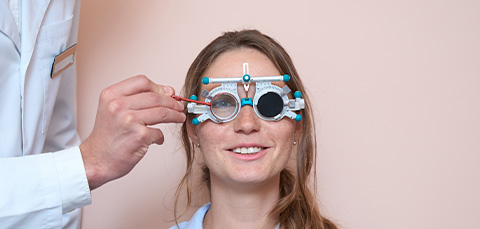Eye floaters after cataract surgery can be annoying, but they are often harmless. Learn why they happen, when to seek help, and what treatment options can restore clear vision and peace of mind.
What are floaters?
Floaters are small, shadowy shapes that appear in a person’s vision. They can look like spots, strings, or cobwebs. They move as the eyes move and may seem to drift away when trying to look at them directly.
Floaters form when tiny fibers inside the vitreous, the gel-like substance in the eye, clump together. These clumps cast shadows on the retina, creating the appearance of floating objects. They are more noticeable against bright backgrounds, such as a clear sky or a white screen.
Floaters are common and usually harmless, but a sudden increase in floaters may indicate an underlying eye condition.
Are floaters normal after cataract surgery?
Floaters are common after cataract surgery. Many people notice them more clearly after the procedure.
Before surgery, cataracts make vision cloudy, which can obscure floaters. Once the cataract is removed and replaced with a clear artificial lens, existing floaters become more visible. In some cases, surgery can also cause changes in the vitreous, leading to new floaters.
While most eye floaters are harmless, a sudden increase, especially with flashes of light or vision loss, may indicate a more serious issue.
What causes floaters after cataract surgery?
Floaters after cataract surgery can occur for several reasons:
Increased visibility: Cataracts make vision blurry, masking existing floaters. After surgery, clear vision makes them more noticeable.
Vitreous changes: Surgery can disturb the vitreous, causing fibers to clump and create new floaters.
Posterior vitreous detachment (PVD): The vitreous shrinks and pulls away from the retina, a common age-related change that may be triggered by surgery.
Inflammation: Mild swelling after surgery can cause temporary floaters.
Retinal tears or detachment: Rare but serious, surgery can sometimes lead to retinal damage, causing a sudden increase in floaters.
Most floaters are harmless, but new or worsening symptoms should be evaluated by an eye specialist.
Do floaters disappear on their own after cataract surgery?
Floaters may fade or become less noticeable over time after cataract surgery. The brain often adapts, making them less bothersome.
In some cases, floaters persist but do not affect vision significantly. If they result from inflammation, they may improve as the eye heals. However, floaters caused by vitreous changes or posterior vitreous detachment (PVD) usually remain.
If floaters are severe and interfere with vision, treatment options like laser therapy or vitrectomy may be considered. A sudden increase in floaters, especially with flashes of light or vision loss, requires prompt medical attention.
Should i worry about floaters after cataract surgery?
Floaters after cataract surgery are usually harmless and a normal part of the healing process. However, certain symptoms may indicate a serious issue and require immediate medical attention:
A sudden increase in floaters
Flashes of light in vision
A shadow or curtain effect in peripheral vision
Blurred or distorted vision
These signs may indicate retinal tears, detachment, or other complications. If any of these occur, consult an eye specialist immediately. Regular follow-ups help monitor floaters and ensure proper healing after surgery.
Are floaters common after cataract surgery?
Yes, floaters are common after cataract surgery. Many patients notice them more because their vision is clearer. Pre-existing eye floaters that were obscured by the cataract become more visible. Surgery can also cause changes in the vitreous, leading to new floaters.
In most cases, these floaters are harmless and do not require treatment. However, a sudden increase or new symptoms like flashes of light or vision loss should be evaluated by an eye specialist.
How long do floaters last after cataract surgery?
The duration of floaters following cataract surgery varies for each person. Some may notice them for a few weeks, while others may have them for months or even years.
General Timeline:
First few weeks: Floaters may seem more noticeable due to clearer vision.
3 to 6 months: The brain often adapts, making floaters less bothersome.
1 year or more: Some floaters may persist but usually do not affect vision.
If floaters are stable and not increasing, they are usually harmless. However, if they suddenly increase, appear with flashes of light, or cause vision loss, seek medical attention.
Typical duration of floaters following eye surgery
Time After Surgery | Floaters Frequency & Appearance | Should You Worry? |
First Few Days | Floaters may appear more noticeable due to clearer vision. Mild inflammation can also cause temporary floaters. | Normal. Monitor for sudden increases or flashes of light. |
First Few Weeks | Floaters may persist but often become less bothersome as the brain adapts. | Normal. Contact an eye specialist if floaters worsen or affect vision. |
3 Months After Cataract Surgery | Most floaters remain stable or become less noticeable. Any inflammation should be resolved. | Normal. If new floaters suddenly appear, consult a doctor. |
6 Months to 1 Year | Persistent floaters may still be present but should not interfere with daily activities. | Normal. If floaters significantly increase or are accompanied by vision changes, seek medical advice. |
1–2 Years After Cataract Surgery | No major changes. If floaters were mild before, they should be less noticeable. | Normal. However, any sudden new floaters, flashes, or vision loss require immediate medical attention. |
Factors affecting the persistence of floaters
Several factors influence how long floaters persist after cataract surgery:
Age: Older individuals are more likely to have persistent floaters due to natural vitreous changes.
Vitreous Changes: If the vitreous gel becomes more liquefied or detaches (posterior vitreous detachment), floaters may last longer.
Pre-existing Floaters: If floaters were present before surgery, they may remain but become more noticeable after cataract removal.
Inflammation: Post-surgical inflammation can cause temporary floaters, which usually resolve as healing progresses.
Eye Health and Previous Conditions: Conditions like diabetic retinopathy or high myopia can lead to more persistent or worsening floaters.
Surgical Technique and Complications: Complications like retinal tears or detachment can cause new floaters that require treatment.
Most floaters become less noticeable over time, but sudden changes should be evaluated by an eye specialist.
What treatment options are available for floaters after cataract surgery?
Most eye floaters do not require treatment, as they become less noticeable over time. However, if they interfere with vision, treatment options are available.
Observation
Many floaters fade or become less bothersome as the brain adapts.
Regular eye exams help monitor any changes.
Laser Vitreolysis
A laser breaks large floaters into smaller, less noticeable pieces.
Best for specific types of floaters but not always effective.
Vitrectomy
A surgical procedure that removes the vitreous gel and replaces it with a clear solution.
Highly effective but carries risks like retinal detachment or infection.
When to Consider Treatment
Floaters significantly impact daily activities.
Symptoms worsen or appear suddenly with flashes or vision loss.
A specialist can determine the best approach based on floater severity and overall eye health.
Surgical options for treating floaters
When floaters severely impact vision and do not improve over time, surgery may be considered. Two main surgical options are available:
Vitrectomy
Removes the vitreous gel along with the floaters.
The eye is filled with a clear solution to maintain its shape.
Highly effective but carries risks such as retinal detachment, infection, or cataract formation in the other eye.
Laser Vitreolysis
A laser breaks large floaters into smaller, less noticeable fragments.
Works best for specific types of floaters, such as those far from the retina.
Less invasive than vitrectomy but not always effective.
When Surgery is Considered
Floaters significantly interfere with daily activities.
Non-surgical treatments have failed.
A specialist confirms that the benefits outweigh the risks.
Surgery is usually a last resort due to potential complications.
When should I see an eye doctor about floaters after cataract surgery?
Floaters are common after cataract surgery, but certain symptoms require immediate medical attention.
Seek Immediate Medical Care If You Experience:
A sudden increase in floaters
Flashes of light in your vision
A dark curtain or shadow blocking part of your vision
Blurred or distorted vision
Eye pain or redness along with floaters
These symptoms could indicate retinal detachment, retinal tear, or other serious complications that require urgent treatment.
Routine Check-Ups
If floaters persist but do not worsen, discuss them at your next scheduled eye exam.
Regular follow-ups help monitor eye health and detect any underlying issues early.
When in doubt, consult an eye specialist to ensure your vision remains healthy.
How eye doctors diagnose and evaluate post-surgical floaters
Eye doctors use several methods to assess floaters after cataract surgery and rule out serious conditions.
Patient History & Symptom Evaluation
The doctor asks about floater onset, frequency, and associated symptoms (e.g., flashes of light, vision loss).
Medical and surgical history is reviewed to check for risk factors like retinal conditions.
Dilated Eye Exam
Eye drops dilate the pupils for a detailed view of the retina and vitreous.
Helps detect retinal tears, detachment, or vitreous changes.
Optical Coherence Tomography (OCT)
A high-resolution scan of the retina to check for abnormalities.
Useful for detecting retinal swelling or damage.
Ultrasound (B-Scan) for the Eye
Used if the retina cannot be seen clearly due to bleeding or other obstructions.
Helps identify vitreous detachment or retinal issues.
Next Steps
If floaters are harmless, no treatment is needed. If serious conditions like a retinal tear are found, immediate intervention may be required. Regular eye exams help monitor floaters and overall eye health.
Can floaters after cataract surgery be prevented?
Floaters cannot always be prevented, but certain steps may reduce the risk of complications that lead to new or worsening floaters.
Careful Surgical Techniques
Skilled surgeons minimize trauma to the vitreous, reducing the risk of vitreous detachment.
Managing Pre-Existing Eye Conditions
Regular eye exams help detect and manage conditions like high myopia or diabetic retinopathy, which increase the risk of floaters.
Post-Surgery Eye Care
Follow all post-operative instructions, including using prescribed eye drops and avoiding strenuous activities.
Protect the eyes from injury and inflammation, which can contribute to floaters.
Regular Eye Check-Ups
Monitoring eye health can help detect early changes and prevent complications like retinal tears.
While floaters are common after cataract surgery, early detection and proper eye care can help manage their impact.





